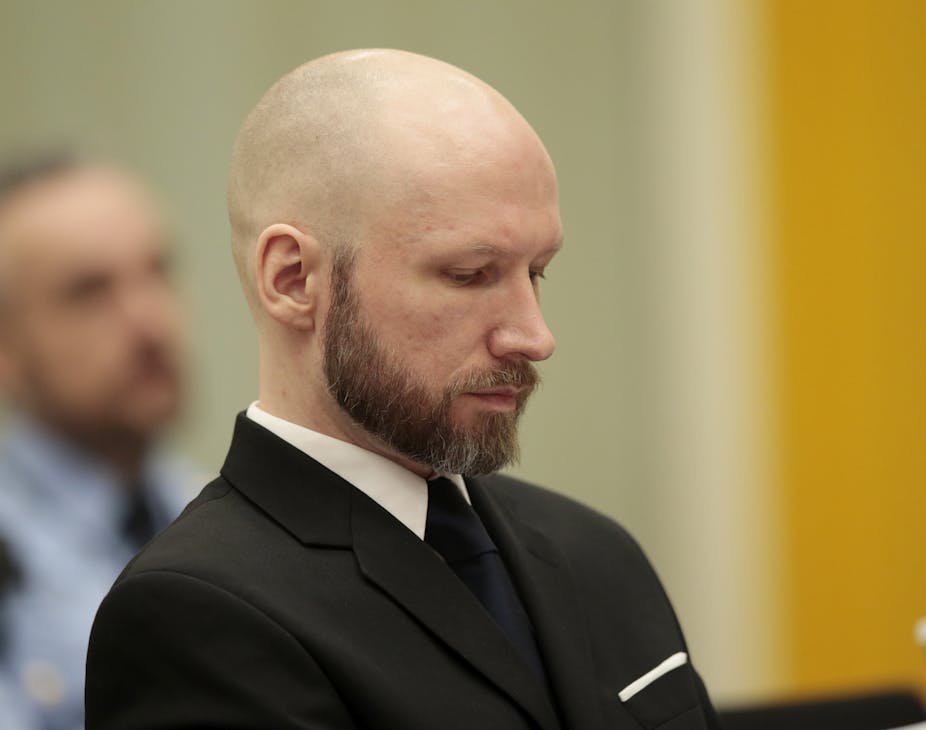Norway is not violating the rights of mass murderer Anders Breivik by keeping him in solitary confinement, according to an appeal ruling on March 1.
The Borgarting Court of Appeal in Oslo delivered its much awaited judgment on the latest chapter of the legal challenge by Breivik, who killed 77 people in two terrorist acts in Norway in 2011. The appeals court overturned an earlier decision of the Oslo District Court and ruled that the conditions of Breivik’s detention have not violated his rights under Article 3 of the European Convention on Human Rights (ECHR) which prohibits torture and inhuman or degrading treatment or punishment.
The Court of Appeal said it was necessary to keep Breivik in solitary confinement and for guards to use handcuffs on him and conduct body searches. It was satisfied that there was risk of violence both from Breivik and against him from other inmates. It said that extensive measures had been taken to compensate for his lack of companionship and that there was an absence of evidence of substantial damage to his mental health due to prolonged isolation.
What is necessary
It is significant that two Norwegian courts have now reached different conclusions about Breivik’s rights under the ECHR. In the original ruling, the Oslo District Court did not doubt that Breivik remained a dangerous ultra-right wing extremist, nor that his detention conditions were generally “good”. But the court was not convinced that the continuous solitary confinement was “strictly necessary” or that adequate measures had been taken to compensate for Breivik’s lack of social interaction.
In the latest ruling, however, the Borgarting Court of Appeal, seems to have placed more emphasis on the fact that Breivik remains apparently remorseless and “strongly affected by his right-wing extremist political universe”. The appeal judges considered it impossible for prison authorities to predict whether and when Breivik may resort to violence again. As such, they ruled that comprehensive security measures including solitary confinement were necessary in view of “strong societal considerations”.
Both Norwegian courts, then, have essentially looked at how necessary the conditions of Breivik’s detention are in order to determine whether they are unlawful. This will depend on the circumstances of each individual case, taking into account the severity of the measure, its duration, and the effect on the prisoner’s well-being.
Apparently similar detention conditions, therefore, can be found to violate Article 3 of the Convention in some circumstances but not in others.
The European Court of Human Rights has been clear that legal opinion on whether treatment is “inhuman” or “degrading” is relative, and depends on all the circumstances of the case. It should not be surprising, therefore, that a slight difference in the weighting of relevant factors has produced different outcomes.
A question of priorities
But taking a wider angle, there is an oxymoron lying at the heart of Breivik’s legal challenge. The current living conditions of the man responsible for one of the most heinous crimes in recent European history seem to be infinitely better than those of refugees and asylum seekers reaching European shores en masse in recent years.
Of course, lowering the standards of treatment we afford prisoners would not resolve the refugee crisis, but this obvious asymmetry does raise existential questions about the priorities of Europe’s human rights protection system.

This is why we need to talk about European democracy more than we need to talk about the Breivik ruling itself. The way Europe – as a diverse but united demos held together by common democratic values – treats terrorists and convicted criminals through its human rights system is an index of the kind of political community we aspire to be.
Our collective commitment to the rule of law and to the protection of fundamental human rights does not, and should not, depend on who may happen to be on the receiving end of torture or inhuman or degrading treatment or punishment. But equally significant is our collective public reaction to judicial decisions such as this that may protect the inalienable rights of abhorrent Neo-Nazi mass murderers.
Constitutional democracy comes at a cost. Part of this cost is to accept that trust in the justice system and in the judiciary, both European and domestic, cannot operate on an a-la-carte basis. In a democratic society, of course, no institution should be entirely insulated from criticism, but it is important to bear in mind that the interpretation of legal rules that are heavily dependent on the facts of each case is an inherently difficult task and one which is rarely going to produce results that satisfy everyone’s sense of right and wrong.
At a time when the political trend on both sides of the Atlantic is to attack and ridicule judges for upholding their constitutional duties, it is important to make sure that the Oslo appeal court is applauded for the right reasons. Credit is due when a court upholds the law regardless of whether its conclusions resonate with the views of the many – not because of it.

